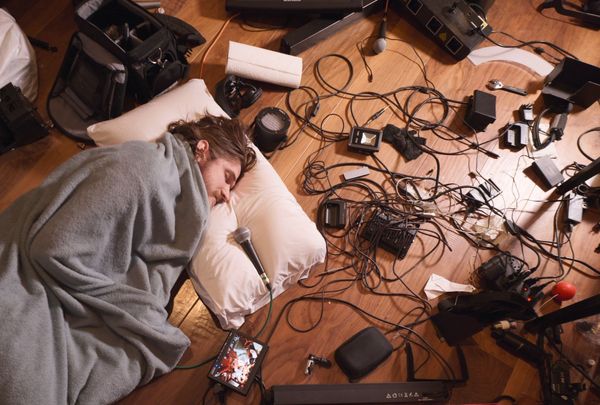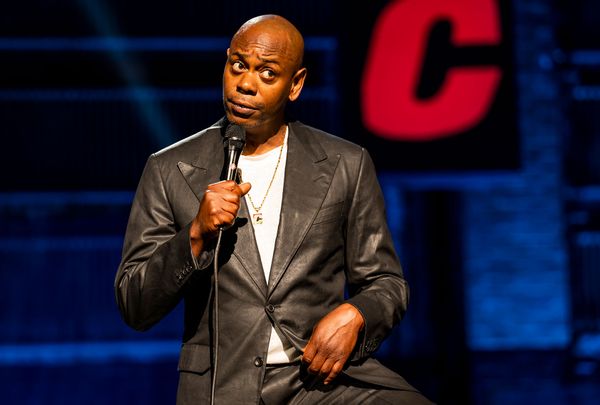
"Baby J" is the latest example of a subgenre that I call cancellation comedy. Examples include Kathy Griffin's "A Hell of A Story," Dave Chappelle's "The Closer," Louis C.K's "Sincerely Louis C.K." and Aziz Ansari's "Right Now," These performances emerge in the aftermath of controversial bits, like Chappelle's provocations aimed at the LGBTQ community, or Griffin's tableau of the decapitation of Donald Trump. In other instances, they arise in the wake of sexual misconduct charges (as occurred with C.K. and Ansari).
Addiction is not a cancellable offense. But alleged mistreatment of a spouse is, for many younger fans of comedy.
Cancellation comedy permits comedians to recycle their controversies into a staged performance. A distant cousin of reality TV, the genre lets celebrity humorists reflect on scandals whose epicenter they themselves inhabit. Given the nation's bottomless thirst for spectacle, the marketability of cancellation comedy should never be underestimated.
Mulaney's special comes in the wake of well-publicized personal travails. The first – which he addresses at length – was his descent into addiction. Here, the former "SNL" writer is truly funny. Upon arriving at the rehab facility in December 2020, Mulaney was dispossessed of two grams of cocaine, baggies full of narcotics and a few thousand dollars. These items were discovered in one of his (hidden) pockets. When questioned by staff, Mulaney attributed their presence to the wonders of objects that accrue in "an old winter coat."
Addiction is not a cancellable offense. But alleged mistreatment of a spouse is, for many younger fans of comedy, an unpardonable sin. Mulaney's second personal travail – which he does not address at all – was his highly publicized divorce from Anna-Marie Tendler and subsequent relationship with Olivia Munn with whom he had a child.
On platforms beloved to Gen Z, like TikTok, this very private episode has sparked rage. It has stimulated frenzied speculation about the parasocial relationships fans develop with comedians. Adding to his internet infamy, Mulaney let Dave Chappelle open for him in Ohio. His colleague reportedly then made transphobic jokes.

Cancellation comedy is about itself.
Visually, "Baby J" is built to support Mulaney's comeback narrative. Unlike Chris Rock's "Selective Outrage," which as New York Magazine pointed out was a hot mess from a production perspective, "Baby J" is cleverly paced, staged and filmed. Featuring a song composed by David Byrne (titled "Drownin' as best I can tell) the show is directed expertly by Alan Timbers.
Mulaney might have been "cocaine skinny" when he was using in 2020, but Timbers' close-range camera shots reveal a different 2023 version: a baggy-eyed storyteller, a bit vulnerable and haggard. The effect is to humanize the comic, who spends much of the set laughing at his own coke-addled stupidity. Festooned in a dark magenta suit, Mulaney looks like a cross between a Vaudeville entertainer and a hedge-fund manager – as we shall see, that is the perfect uniform for cancellation comedy!
Early on, Mulaney razzes fellow comedian Bo Burnham ("All of the kids like Bo Burnham more because he's currently less problematic"). Herein lies a generational divide which cleaves today's comedic marketplace. On one side are those who can indulge a little "punch-down" humor, a la Chappelle and C.K. On the other, are all those "kids" (by which Mulaney means Gen Z) who usually loathe those sorts of jokes. This generation is also less likely to "separate the artist from the art" than their elders may be; an artist's personal misconduct greatly colors their reception of the art.

Cancellation comedy can be really funny, but nothing more than that. It doesn't push boundaries.
This raises the question as to what the purpose of cancellation comedy is. For starters, cancellation comedy is trying to seize the day and make bank. Comedy is scaling up; the upper-tier economics of the art form have changed radically over the past decade. Kevin Hart playing in front of 53,000 people in Philadelphia is a truly mind-bending data point. The audience is there: how does one monetize it?
Cancellation comedy has an answer! All you need is a celebrity comedian, and a scandal. This lends the genre an inauthentic feel, none of which is lessened by its oddly "meta" nature. Cancellation comedy is about itself. We are not only watching a Dave Chappelle comedy special. We are watching a Dave Chappelle comedy special in which Dave Chappelle uses his comedy to address controversies Dave Chappelle created in previous comedy specials.

For audiences, cancellation comedy offers a chance to simultaneously enjoy elite talents like Mulaney and the bloodsport of real people fighting and suffering. For comedians, it offers a lucrative platform to regain control of their narrative. In Mulaney's case, the special signals that he's back and not a bad guy either (and maybe that he will heal himself through comedy).
Cancellation comedy can be really funny, but nothing more than that. It doesn't push boundaries like, let's say, the frantically cerebral "A Black Lady's Sketch Show," or Jerrod Carmichael's "Rothaniel" (directed by Burnham), Ultimately, cancellation comedy is a financial instrument, an investment in the future of a distressed comic property.
"Baby J: A Wide-Ranging Conversation" is streaming on Netflix.







